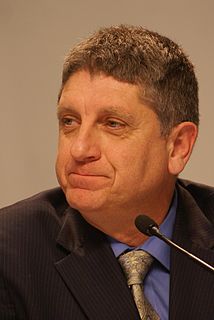A Quote by Gao Xingjian
Literary revolution and revolutionary literature did not create a beautiful new world but instead divested literature of its basic nature, promoted violence, and, by resorting to linguistic violence, made a battlefield of this domain of spiritual freedom.
Related Quotes
Even in the most peaceful communities, an appetite for violence shows up in dreams, fantasies, sports, play, literature, movies and television. And, so long as we don't transform into angels, violence and the threat of violence - as in punishment and deterrence - is needed to rein in our worst instincts.
I think it's likely that the civilizing effect of literature has done most of the work, and still continues to do. Look at Steven Pinker's book, The Better Angels of Our Nature: Why Violence Has Declined. It proves beyond any shadow of doubt that violence has declined dramatically throughout the centuries. There are various reasons for it: the rise of the state, Leviathan, the monopoly of violence, children's rights, animal rights. They're all positive signs.
I must remind you that starving a child is violence. Suppressing a culture is violence. Neglecting school children is violence. Punishing a mother and her family is violence. Discrimination against a working man is violence. Ghetto housing is violence. Ignoring medical need is violence. Contempt for poverty is violence.
We must realize that violence is not confined to physical violence. Fear is violence, caste discrimination is violence, exploitation of others, however subtle, is violence, segregation is violence, thinking ill of others and condemning others are violence. In order to reduce individual acts of physical violence, we must work to eliminate violence at all levels, mental, verbal, personal, and social, including violence to animals, plants, and all other forms of life.
If we were going to address what involves the biggest number of women, reproductive freedom is a fundamental human right - like freedom of speech, the most basic right. Freedom from violence, since women worldwide are still like 70% at least of all victims of violence. Equality in the family, democracy in the family, since the family is the microcosm of everything else, so if you have inequality and violence in the family, it normalizes it in the street, for foreign policy, for every place else.
Literature cannot develop between the categories "permitted"—"not permitted"—"this you can and that you can't." Literature that is not the air of its contemporary society, that dares not warn in time against threatening moral and social dangers, such literature does not deserve the name of literature; it is only a facade. Such literature loses the confidence of its own people, and its published works are used as waste paper instead of being read. -Letter to the Fourth National Congress of Soviet Writers
The founders of the United Nations sought to replace a world at war with a world of civilized order. They hoped that a world of relentless conflict would give way to a new era, one where freedom from violence prevailed.... But the awful truth is that the use of violence for political gain has become more, not less, widespread in the last decade.
Violence never really deals with the basic evil of the situation. Violence may murder the murderer, but it doesn’t murder murder. Violence may murder the liar, but it doesn’t murder lie; it doesn’t establish truth. Violence may even murder the dishonest man, but it doesn’t murder dishonesty. Violence may go to the point of murdering the hater, but it doesn’t murder hate. It may increase hate. It is always a descending spiral leading nowhere. This is the ultimate weakness of violence: It multiplies evil and violence in the universe. It doesn’t solve any problems.







































